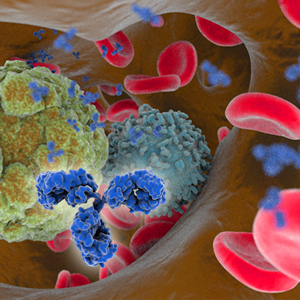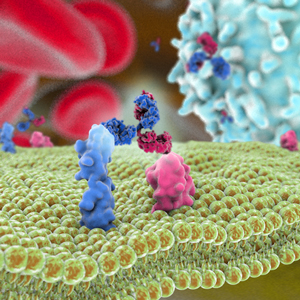 The pace of antibody therapeutics development accelerated in 2017, and this faster pace is projected to continue through 2018. Notably, the annual number of antibody therapeutics granted a first approval in either the European Union (EU) or United States (US) reached double-digits (total of 10) for the first time in 2017. The 10 antibodies granted approvals are: brodalumab, dupilumab, sarilumab, guselkumab, benralizumab, ocrelizumab, inotuzumab ozogamicin, avelumab, duvalumab, and emicizumab. Brodalumab, however, had already been approved in Japan in 2016.
The pace of antibody therapeutics development accelerated in 2017, and this faster pace is projected to continue through 2018. Notably, the annual number of antibody therapeutics granted a first approval in either the European Union (EU) or United States (US) reached double-digits (total of 10) for the first time in 2017. The 10 antibodies granted approvals are: brodalumab, dupilumab, sarilumab, guselkumab, benralizumab, ocrelizumab, inotuzumab ozogamicin, avelumab, duvalumab, and emicizumab. Brodalumab, however, had already been approved in Japan in 2016.
As of mid-December 2017, 10 antibody therapeutics (ibalizumab, burosumab, tildrakizumab, caplacizumab, erenumab, fremanezumab, galcanezumab, romosozumab, mogamulizumab, cemiplimab) were in regulatory review in the EU or US, and regulatory actions on their marketing applications are expected by the end of 2018.
Based on company announcements and estimated clinical study primary completion dates, and assuming the study results are positive, marketing applications for at least 13 antibody therapeutics that are now being evaluated in late-stage clinical studies may be submitted by the end of 2018. Of the 13 candidates, 8 are for non-cancer indications (lanadelumab, crizanlizumab, ravulizumab, eptinezumab, risankizumab, satralizumab, brolucizumab, PRO140) and 5 are for cancer (sacituzumab govitecan, moxetumomab pasudotox, cemiplimab, ublituximab, isatuximab).
Additional antibody therapeutics to watch in 2018 include 19 mAbs undergoing evaluation in late-stage studies with primary completion dates in late 2017 or during 2018. Of these mAbs, 9 are for non-cancer indications (lampalizumab, roledumab, emapalumab, fasinumab, tanezumab, etrolizumab, NEOD001, gantenerumab, anifrolumab) and 10 are for cancer indications (tremelimumab, isatuximab, BCD-100, carotuximab, camrelizumab, IBI308, glembatumumab vedotin, mirvetuximab soravtansine, oportuzumab monatox, L19IL2/L19TNF). Positive clinical study results may enable marketing application submissions in 2018. Brief summaries of these antibody therapeutics are provided in the ‘Antibodies to watch in 2018’ article, which is now available on the mAbs website. A PDF of this open-access article is available here.
AIRR Community Overview published in Frontiers of Immunology
The AIRR Community has published a perspective article explaining the importance of “Reproducibility and Reuse of Adaptive Immune Receptor Repertoire Data” and the goals of the AIRR Community in the Frontiers of Immunology – https://doi.org/10.3389/fimmu.2017.01418
AIRR Minimal Standards recommendations in Nature Immunology
The Minimal Standards Working Group, and indeed, the entire AIRR Community, has published a set of recommendations for the Minimal Information required for sharing of Adaptive Immune Receptor Repertoire (MiAIRR) Data in Nature Immunology – https://www.nature.com/articles/ni.3873
Emicizumab granted FDA approval
 Emicizumab (Hemlibra, emicizumab-kxwh, ACE910, RO5534262), a bispecific IgG4 mAb targeting Factors IXa and X, was approved by the FDA on November 16, 2017. The drug, which is administered once a week, was approved to prevent or reduce the frequency of bleeding episodes in adult and pediatric patients with hemophilia A who have developed Factor VIII inhibitors. The biologics license application was granted Priority Review and a Breakthrough Therapy designation. Hemlibra was also granted an orphan drug designation by the FDA.
Emicizumab (Hemlibra, emicizumab-kxwh, ACE910, RO5534262), a bispecific IgG4 mAb targeting Factors IXa and X, was approved by the FDA on November 16, 2017. The drug, which is administered once a week, was approved to prevent or reduce the frequency of bleeding episodes in adult and pediatric patients with hemophilia A who have developed Factor VIII inhibitors. The biologics license application was granted Priority Review and a Breakthrough Therapy designation. Hemlibra was also granted an orphan drug designation by the FDA.
Marketing applications for emicizumab are under review in the European Union and Japan; the European Medicines Agency is reviewing the marketing authorization application under accelerated assessment. Emicizumab was granted an orphan drug designation in Japan for the prevention and reduction of bleeding episodes in patients with congenital factor VIII deficiency with inhibitors. The drug was created by Chugai Pharmaceutical Co., Ltd. and co-developed by Chugai, Roche and Genentech.
The marketing applications for emicizumab include results from the Phase 3 HAVEN 1 (NCT02622321) study and interim analysis of the HAVEN 2 (NCT02795767) study. In the HAVEN 1 study, adult and adolescent patients (12 or older) who had previously received episodic treatment with bypassing agents were randomly assigned in a 2:1 ratio to emicizumab prophylaxis (group A) or no prophylaxis (group B). The primary end point of the study was the difference in bleeding rates between Group A and Group B. Emicizumab was administered subcutaneously at a dose of 3 milligrams per kilogram per week (mg/kg/week) for 4 weeks followed by 1.5 mg/kg/week up to the end of the study. The annualized bleeding rate in Group A was reduced by 87% compared to Group B (2.9 events vs 23.3 events, P<0.001). [1] The HAVEN 2 study is evaluating the efficacy, safety, and pharmacokinetics of subcutaneous administration of emicizumab in hemophilia A pediatric patients with inhibitors.
1. Oldenburg J, Mahlangu JN, Kim B, Schmitt C, Callaghan MU, Young G, Santagostino E, Kruse-Jarres R, Negrier C, Kessler C, et al. Emicizumab prophylaxis in hemophilia A with inhibitors. N Engl J Med. 2017;377(9):809-818. doi: 10.1056/NEJMoa1703068.
The Antibody Society maintains a comprehensive table of approved antibody therapeutics and those in regulatory review in the EU or US. As of November 16, 2017, a total of 10 mAbs have been granted first approvals in either the US or EU in 2017, and marketing applications for a total of 9 antibody therapeutics that have not yet been approved in either the EU or US are undergoing review in these regions.
Please log in to access the table, located in the Members Only section.
Not a member? Please join! Membership is free for students and employees of the Society’s corporate sponsors.
Benralizumab granted FDA approval
 On November 14, 2017, AstraZeneca announced that benralizumab (Fasenra), an afucosylated IgG1 mab targeting the alpha subunit of IL-5R found on eosinophils, received a US Food and Drug Administration approval for the add-on maintenance treatment of patients with severe asthma aged 12 years and older, and with an eosinophilic phenotype. The European Medicines Agency’s Committee for Medicinal Products for Human Use adopted a positive opinion on November 10, 2017, recommending the marketing authorization of benralizumab as an add-on maintenance treatment in adult patients with severe eosinophilic asthma inadequately controlled despite high-dose inhaled corticosteroids plus long-acting b-agonists. The European Commission’s decision regarding marketing authorization in the EU is pending. Marketing applications for benralizumab are undergoing review in Japan and other countries. The mAb was in-licensed from BioWa, Inc., a wholly-owned subsidiary of Kyowa Hakko Kirin Co., Ltd. by MedImmune.
On November 14, 2017, AstraZeneca announced that benralizumab (Fasenra), an afucosylated IgG1 mab targeting the alpha subunit of IL-5R found on eosinophils, received a US Food and Drug Administration approval for the add-on maintenance treatment of patients with severe asthma aged 12 years and older, and with an eosinophilic phenotype. The European Medicines Agency’s Committee for Medicinal Products for Human Use adopted a positive opinion on November 10, 2017, recommending the marketing authorization of benralizumab as an add-on maintenance treatment in adult patients with severe eosinophilic asthma inadequately controlled despite high-dose inhaled corticosteroids plus long-acting b-agonists. The European Commission’s decision regarding marketing authorization in the EU is pending. Marketing applications for benralizumab are undergoing review in Japan and other countries. The mAb was in-licensed from BioWa, Inc., a wholly-owned subsidiary of Kyowa Hakko Kirin Co., Ltd. by MedImmune.
The safety and efficacy of benralizumab as a treatment for asthma were evaluated in the WINDWARD program, which included six Phase 3 trials, SIROCCO, CALIMA, ZONDA, BISE, BORA and GREGALE. The randomized, double-blinded, parallel-group, placebo-controlled SIROCCO (NCT01928771) and CALIMA (NCT01914757) trials evaluated the efficacy and safety of a regular, subcutaneous administration of a fixed 30 mg dose of benralizumab for up to 56 weeks in exacerbation-prone adult and adolescent patients 12 years of age and older. Study results were published in 2016. [1, 2] In the 28-week randomized ZONDA study (NCT02075255), the effects of 30 mg benralizumab administered subcutaneously either every 4 weeks or every 8 weeks (with the first three doses administered every 4 weeks) versus placebo on the reduction in the oral glucocorticoid dose while asthma control was maintained in adult patients with severe asthma. The study’s primary outcome measure, percentage reduction in final oral steroid dose compared with baseline while maintaining asthma control, was met. The median final oral glucocorticoid doses from baseline were reduced by 75% in patients who received either dose of benralizumab, compared with a reduction of 25% in the oral glucocorticoid doses in the placebo group (P<0.001 for both comparisons). [3]
- Bleecker ER, FitzGerald JM, Chanez P, Papi A, Weinstein SF, Barker P, Sproule S, Gilmartin G, Aurivillius M, Werkström V, et al. Efficacy and safety of benralizumab for patients with severe asthma uncontrolled with high-dosage inhaled corticosteroids and long-acting β2-agonists (SIROCCO): a randomised, multicentre, placebo-controlled phase 3 trial. Lancet 2016; pii: S0140-6736(16)31324-1. doi: 10.1016/S0140-6736(16)31324-1.
- FitzGerald JM, Bleecker ER, Nair P, Korn S, Ohta K, Lommatzsch M, Ferguson GT, Busse WW, Barker P, Sproule S, et al. Benralizumab, an anti-interleukin-5 receptor α monoclonal antibody, as add-on treatment for patients with severe, uncontrolled, eosinophilic asthma (CALIMA): a randomised, double-blind, placebo-controlled phase 3 trial. Lancet. 2016; pii: S0140-6736(16)31322-8. doi: 10.1016/S0140-6736(16)31322-8.
- Nair P, Wenzel S, Rabe KF, Bourdin A, Lugogo NL, Kuna P, Barker P, Sproule S, Ponnarambil S, Goldman M; ZONDA Trial Investigators. Oral Glucocorticoid-Sparing Effect of Benralizumab in Severe Asthma. N Engl J Med. 2017;376(25):2448-2458. doi: 10.1056/NEJMoa1703501.
The Antibody Society maintains a comprehensive table of approved antibody therapeutics and those in regulatory review in the EU or US. As of November 15, 2017, a total of 9 mAbs have been granted first approvals in either the US or EU in 2017, and marketing applications for a total of 10 antibody therapeutics that have not yet been approved in either the EU or US are undergoing review in these regions.
Please log in to access the table, located in the Members Only section.
Not a member? Please join! Membership is free for students and employees of the Society’s corporate sponsors.

